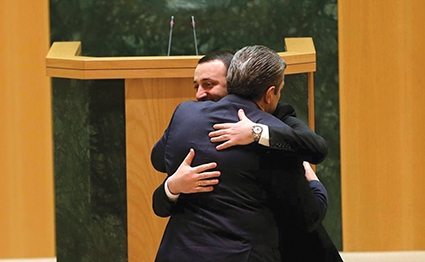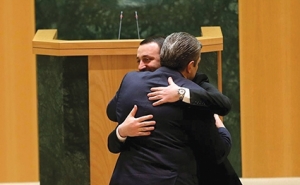Next! New Prime Minister Boasts Achievements While Critics Murmur of Instability
Last week the Parliament of Georgia approved a new Cabinet headed by the new Prime Minister, Giorgi Kvirikashvili.
Eighty-six MPs voted in favor of the government, while 28 were against. The main parliamentary opposition, United National Movement (UNM) and the Free Democrats did not support the decision.
In his comments at the parliamentary hearing, PM Kvirikashvili declared that the Georgian Dream has established a new culture in Georgian politics, demonstrating how a government should act in accordance with its population’s interests.
PM Kvirikashvili named health reforms and others as an achievement of his government, adding, “We can name more examples but the main thing is that the government listens to its voters.”
He indicated that economic development, encouraging an entrepreneurial spirit and alleviating the bureaucratic burden for businesses will be among the government’s top domestic priorities. In his comments, PM Kvirikashvili affirmed the government’s “readiness for constructive cooperation” with opposition parties on policy initiatives.
Regarding the Russian-occupied territories, he asserted, “We must double our efforts under the reconciliation policy...Once again, we reaffirm our commitment to sharing access to every benefit and success in the country with our Abkhazian and Ossetian brothers and sisters.”
He also emphasized that a pragmatic approach toward Russia, including the Geneva International Discussions and the format of direct dialogue between the PM’s Special Representative for Relations with Russia and Russia’s Deputy Foreign Minister, aims at mitigating risks towards Georgia’s path of European integration.
PM Kvirikashvili stressed the importance of establishing a strong culture of communication between the government and citizens and civil society.
“In 2012 the Georgian people chose our government to serve them. A lot has been done by this government to demonstrate how it is possible for the government to listen to its people,” said the Prime Minister.
Despite the new PM’s announcement regarding the possibility of changes in the Cabinet, the Cabinet members remain unchanged, except for the post of Foreign Minister, now occupied by Mikheil Janelidze.
In ‘Georgia Analysis,’ a bi-monthly analysis of political and other major developments in Georgia by international political analyst Lincoln Mitchell, the scholar says the resignation of Georgian Prime Minister Irakli Garibashvili was to be expected.
According to Mitchell, Garibashvili was always heavily dependent upon the good will of his predecessor, Bidzina Ivanishvili, and named him a protégé of Ivanishvili.
Mitchell emphasized the appointment of the new PM indicated to governmental instability. “Kvirikashvili will be Georgia’s third Prime Minister since the 2012 election. While this is not, in of itself, a strong cause for significant concern, it suggests an instability in the government that has, and will continue to raise challenges related to governance,” Mitchell said.
Author Opinion
Opinions around the new PM’s potential to succeed are disunited, as the opposition is concerned Kvirikashvili will be controlled by Ivanishvili. Ivanishvili himself claims he has had no formal affiliation with Georgian politics since 2013 despite suggestions otherwise.
Although PM Kvirikashvili at the parliamentary hearing was considered as more diplomatic and constructive than his predecessor, UNM was quick to remind him about the “unsuccessful three years of his government,” highlighting the issues of economic shock in the country, devalued national currency, and increased crime, claiming “these are GD’s key achievements during their governance.”
For a professional observer or a commentator, the profile of Giorgi Kvirikashvili is hard to judge negatively; however, his direct link with Ivanishvili almost certainly eliminates the chance that the governmental leader will be independent in his decisions and policies.
Zviad Adzinbaia












